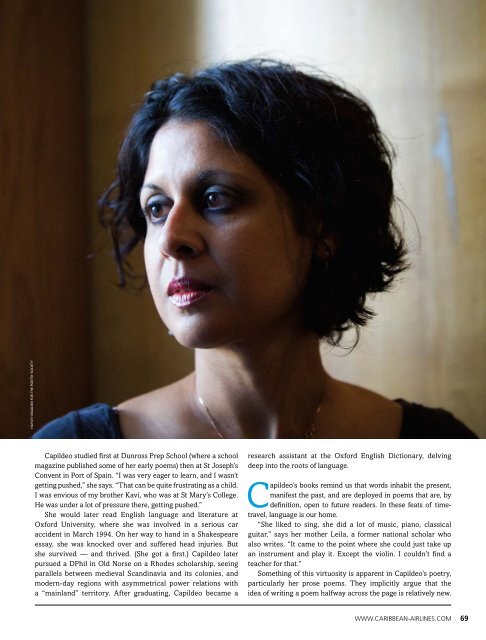Caribbean Beat — January/February 2017 (#143)
A calendar of events; music, film, and book reviews; travel features; people profiles, and much more.
A calendar of events; music, film, and book reviews; travel features; people profiles, and much more.
Create successful ePaper yourself
Turn your PDF publications into a flip-book with our unique Google optimized e-Paper software.
Hayley Madden for The Poetry Society<br />
Capildeo studied first at Dunross Prep School (where a school<br />
magazine published some of her early poems) then at St Joseph’s<br />
Convent in Port of Spain. “I was very eager to learn, and I wasn’t<br />
getting pushed,” she says. “That can be quite frustrating as a child.<br />
I was envious of my brother Kavi, who was at St Mary’s College.<br />
He was under a lot of pressure there, getting pushed.”<br />
She would later read English language and literature at<br />
Oxford University, where she was involved in a serious car<br />
accident in March 1994. On her way to hand in a Shakespeare<br />
essay, she was knocked over and suffered head injuries. But<br />
she survived <strong>—</strong> and thrived. (She got a first.) Capildeo later<br />
pursued a DPhil in Old Norse on a Rhodes scholarship, seeing<br />
parallels between medieval Scandinavia and its colonies, and<br />
modern-day regions with asymmetrical power relations with<br />
a “mainland” territory. After graduating, Capildeo became a<br />
research assistant at the Oxford English Dictionary, delving<br />
deep into the roots of language.<br />
Capildeo’s books remind us that words inhabit the present,<br />
manifest the past, and are deployed in poems that are, by<br />
definition, open to future readers. In these feats of timetravel,<br />
language is our home.<br />
“She liked to sing, she did a lot of music, piano, classical<br />
guitar,” says her mother Leila, a former national scholar who<br />
also writes. “It came to the point where she could just take up<br />
an instrument and play it. Except the violin. I couldn’t find a<br />
teacher for that.”<br />
Something of this virtuosity is apparent in Capildeo’s poetry,<br />
particularly her prose poems. They implicitly argue that the<br />
idea of writing a poem halfway across the page is relatively new.<br />
WWW.CARIBBEAN-AIRLINES.COM 69


















